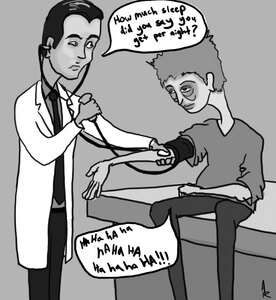Cheating your sleep cycle isn’t worth it
The final stretch of spring semester is here, unofficially coinciding with a dramatic surge in the number of all-nighters on campus.
Popular research in neuroscience reveals that sleep deprivation can cause a euphoric experience, which can alleviate depression or simply cause better, sprightlier moods. After reviewing images of the brain, the late Dr. J. Christian Gillin, a renowned sleep specialist and professor of psychiatry at UCSD, saw a specific frontal area of the cerebral cortex — termed the anterior cingulate cortex, which is overactive in depressed patients — had normal levels of activity when those patients were sleep-deprived.
But such a discovery stands to combat the serious side effects of sleep deprivation. Students should be better educated about the harmful effects of voluntary insomnia.
One serious side effect is the ability to maintain normal cognitive and motor performance in class, at work and even in everyday life. In fact, just 10 years ago, a study done by A. M. Williamson and Anne-Marie Feyer demonstrated prolonged sleep deprivation is equivalent, if not worse, to consuming large amounts of alcohol — 17 to 19 hours without sleep can be the equivalent of a blood alcohol content of .05 percent. In general, sleep deprivation causes a reduction in performance and alertness.
WebMD reports that reducing your nighttime sleep by one and a half hours reduces alertness during the daytime by 32 percent, significantly affecting participation in class, extracurricular activities and even social activities.
Sleep deprivation increases blood pressure and stress hormone levels, making it difficult for your body to process blood sugar and reducing an important appetite-depressing hormone.
Deprivation could form problems with metabolism and weight, especially important for college students intent on maintaining a good body image. It is even more dangerous because research has shown a significant correlation between deprivation and serious medical problems — including obesity, psychiatric problems such as depression or mood imbalances, high blood pressure, heart attack, heart failure and even stroke.
It’s especially important to note that sleep deprivation causes an adverse affect on the immune system. So, during those semesters when everyone has been catching that illness, even something as common as the flu, there is a good possibility that your body’s lack of sleep might impair its ability to fight it off.
While I’m glad to note that my all-nighters can bring me some short-lived delirious joy, I fear that the overall health risks are too big to take.
However, the life of a college student, from studying for exams to writing essays to reading assigned texts (to even doing this article), as well as juggling extracurricular activities, community groups, meetings and jobs (not to mention maintaining a social life), sleep is the last on the list.
“In college, you can only do two of three things: have a social life, do well academically and sleep,” said Neil Bhattacharya, a freshman majoring in biology and health policy and management.
To sleep or not to sleep — that is the question.
Balancing a busy schedule seems to be a part of the college experience, but we should be mindful of the consequences of our decisions.
Miruna Barnoschi is a freshman majoring in international relations.

